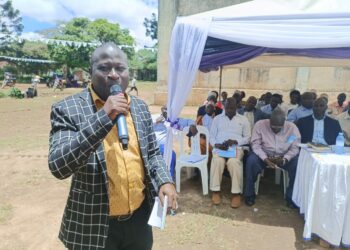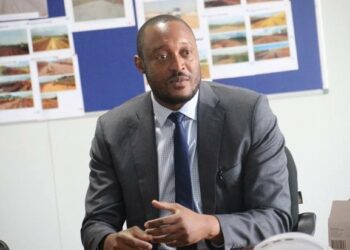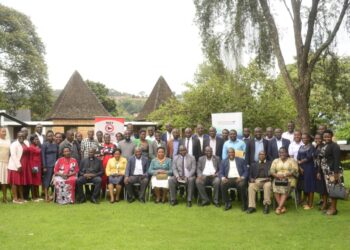A wave of anxiety is sweeping across African economies, with experts raising alarms about the potential impact of political changes in Washington due to the upcoming U.S elections, on the continent’s economic future.
During the 8th Uganda Economic Growth Forum, the country’s leading economic minds convened to discuss the critical challenges that could arise from the U.S. election and its impact on Africa’s developmental trajectory.
Held at Serena Hotel Kampala, the high-stakes symposium which concluded on Friday was themed “Navigating Global Economic Uncertainty: Africa’s Path Forward”
It was organized by the Ministry of Finance in partnership with the Uganda Economic Society and the African Development Forum and brought together over 500 participants, including representatives from the African Union, the United Nations Economic Commission for Africa (UNECA), and major financial institutions like the African Development Bank (AfDB) and the World Bank.
The symposium underscored the urgency of understanding and mitigating the potential economic fallout from shifts in U.S. foreign and economic policy post-election, with a particular focus on the repercussions for African economies.
Central to the discussions was Uganda’s ambitious economic transformation plan, a visionary blueprint designed to catapult the nation’s economy to new heights by 2040. The plan is nothing short of audacious, setting forth objectives that, if achieved, would fundamentally reshape Uganda’s economic landscape and position it as a formidable player in the global economy.
The targets are as ambitious as they are transformative: doubling the Gross Domestic Product (GDP) every five years, raising per capita GDP from the current $1,146 to an impressive $7,000 by 2039/40, and increasing the national savings rate from 20% to 40% of GDP.
Additionally, the plan envisions a significant boost in Uganda’s export performance, with the share of exports in GDP expected to surge from 12% to a staggering 50%, while annual Foreign Direct Investment (FDI) inflows are projected to skyrocket from $2.9 billion in 2022 to an extraordinary $50 billion by 2040.
The economic blueprint is rooted in the belief that Uganda’s untapped potential, if fully realized, could drive unprecedented growth and development. Moses Bekabye, the Technical Advisor on Economic Affairs at the Ministry of Finance, delivered an impassioned address, outlining the vision and the critical steps needed to achieve these lofty goals. “Uganda’s strategic vision is built on a foundation of immense economic potential that remains largely untapped,” Bekabye asserted. “This plan is not merely aspirational; it is a roadmap grounded in the reality of our resources, our people, and our capacity for growth. But to realize this vision, we need more than just economic strategies—we need unwavering political will, both within our borders and in the international arena.”
Bekabye highlighted that the strategic vision is driven by several key objectives, including job creation, poverty reduction, and the enhancement of household incomes through the expansion of enterprises and manufacturing capacities. “Our economy has the potential to support millions of new jobs, increase household incomes, and transform the lives of our citizens. However, achieving this requires a coordinated effort to expand our manufacturing base, enhance our value addition capacities, and tap into new and emerging markets,” he explained.
Leveraging Natural Resources and Regional Integration
Uganda’s economic plan also emphasizes the strategic exploitation of its abundant natural resources, including oil and gas, gold, and iron ore. The discovery of commercially viable oil deposits in the Albertine Graben region has been heralded as a game-changer for the country, with the potential to generate significant revenue and drive industrialization.
However, as Bekabye cautioned, that the successful development of these resources hinges on favorable global market conditions and political stability—factors that could be influenced by the outcome of the U.S. election.
“In addition to our natural resources, we are strategically positioned to benefit from population growth and the demographic dividend,” Bekabye noted. Uganda’s youthful population presents both a challenge and an opportunity, with the potential to drive economic growth if adequately harnessed through education, skills development, and employment opportunities.
Regional integration is another pillar of Uganda’s economic plan, with the government prioritizing enhanced cooperation within the East African Community (EAC) and the African Continental Free Trade Area (AfCFTA). “Regional integration offers us the opportunity to access larger markets, attract investment, and build resilience against external shocks,” Bekabye stated. He pointed out that the AfCFTA, which creates the world’s largest free trade area by number of countries, is a critical platform for Uganda to expand its export base and integrate into global value chains.
Domestic Savings and Investment: Reducing Reliance on External Debt
One of the most ambitious aspects of Uganda’s economic plan is the target to increase domestic savings to finance investments, thereby reducing the country’s reliance on external debt. The plan aims to raise the national savings rate from the current 20% to 40% of GDP, a move that Bekabye described as essential for sustaining long-term economic growth. “By increasing our domestic savings, we can finance our own development and reduce our vulnerability to external shocks,” he explained. “This is particularly important in light of the potential risks posed by changes in global financial conditions, which could be influenced by the U.S. election.”
The emphasis on domestic savings is also tied to the need for a more conducive policy and regulatory environment. Bekabye called for urgent reforms to close gaps in the policy framework, streamline regulations, and enhance the ease of doing business. “Our ability to attract investment and drive economic growth depends on having a regulatory environment that is transparent, predictable, and supportive of private sector development,” he stressed.
The U.S. Election: A Cloud of Uncertainty
Despite the optimism surrounding Uganda’s economic plan, there is a growing sense of unease among experts regarding the potential impact of the U.S. election on Africa’s economic prospects. The symposium’s discussions made it clear that the outcome of the election could have far-reaching consequences for African economies, particularly in terms of trade, investment, and aid.
“There is no denying that Africa’s economic future is intricately linked to global dynamics, and the U.S. election is a major event that could reshape the global economic landscape,” Bekabye warned. “Any significant changes in U.S. policies post-election could have a domino effect on our markets, our currencies, and our economic plans. We must be prepared to navigate these uncertainties and build resilience into our economic strategies.”
The potential risks are manifold. A shift in U.S. trade policies could lead to changes in tariffs, sanctions, or other trade barriers that could disrupt African exports to the U.S. market. Similarly, changes in U.S. foreign aid policies could impact development assistance programs that many African countries, including Uganda, rely on for health, education, and infrastructure projects. Furthermore, a tightening of U.S. monetary policy could lead to capital flight from emerging markets, increasing the cost of borrowing and exacerbating debt burdens.
The U.S. election, with its potential to alter the global economic order, represents a significant source of uncertainty that could impact Uganda’s ability to achieve its ambitious targets.
However, the overarching sentiment was one of cautious optimism. Uganda’s economic potential remains vast, and with the right strategies, the country can navigate the challenges ahead.
The focus now is on building resilience, enhancing regional integration, and forging partnerships that can withstand the winds of change.
Do you have a story in your community or an opinion to share with us: Email us at editorial@watchdoguganda.com













